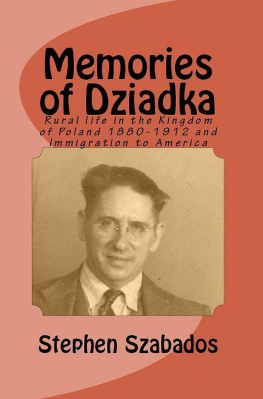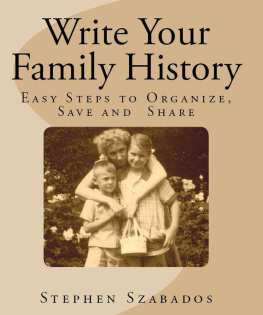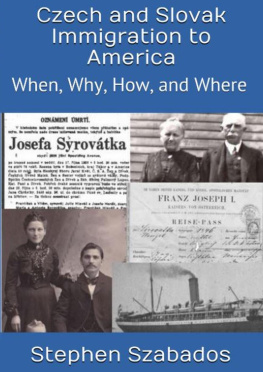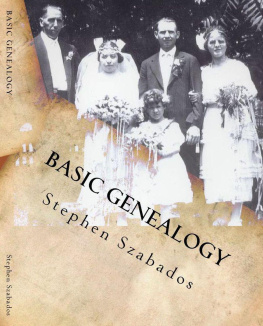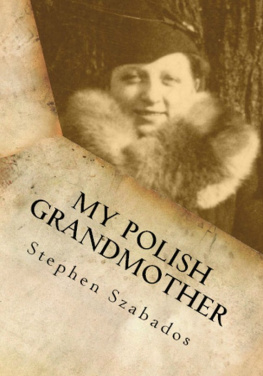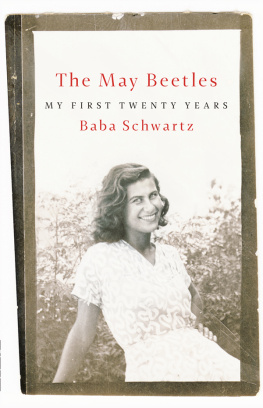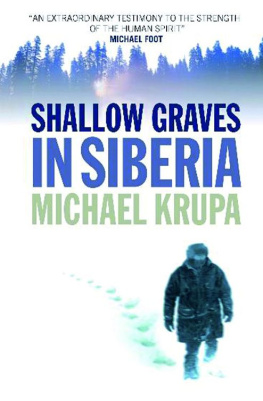Stephen Szabados - Memories of Dziadka: Rural life in the Kingdom of Poland 1880-1912 and Immigration to America
Here you can read online Stephen Szabados - Memories of Dziadka: Rural life in the Kingdom of Poland 1880-1912 and Immigration to America full text of the book (entire story) in english for free. Download pdf and epub, get meaning, cover and reviews about this ebook. year: 2020, publisher: Stephen Szabados, genre: Home and family. Description of the work, (preface) as well as reviews are available. Best literature library LitArk.com created for fans of good reading and offers a wide selection of genres:
Romance novel
Science fiction
Adventure
Detective
Science
History
Home and family
Prose
Art
Politics
Computer
Non-fiction
Religion
Business
Children
Humor
Choose a favorite category and find really read worthwhile books. Enjoy immersion in the world of imagination, feel the emotions of the characters or learn something new for yourself, make an fascinating discovery.
- Book:Memories of Dziadka: Rural life in the Kingdom of Poland 1880-1912 and Immigration to America
- Author:
- Publisher:Stephen Szabados
- Genre:
- Year:2020
- Rating:4 / 5
- Favourites:Add to favourites
- Your mark:
Memories of Dziadka: Rural life in the Kingdom of Poland 1880-1912 and Immigration to America: summary, description and annotation
We offer to read an annotation, description, summary or preface (depends on what the author of the book "Memories of Dziadka: Rural life in the Kingdom of Poland 1880-1912 and Immigration to America" wrote himself). If you haven't found the necessary information about the book — write in the comments, we will try to find it.
This book is about the life of a Polish immigrant from the Russian partition of Poland. It first describes the area where he was born. The next chapter lists many facts and activities of his early life in rural Polish Russia. The third chapter describes the customs and traditions that his family celebrated as he grew to manhood. Chapter Four discusses the possible reasons for his decision to leave his family and the land of his birth. Chapter Five describes his trek across Poland and Germany to the port of Bremerhaven, his experience in the port, and his voyage across the North Atlantic Ocean. The next chapter discusses his arrival in America and the process for admittance to the United States after leaving the ship. This chapter also describes his train trip from Philadelphia to Bloomington, Illinois. Chapter Seven details his life in America.
I wanted to put some of the interesting stories that I had of Polish immigrants together in one place to make it easy for other people to read and understand their hardships. My hope in writing this book is to share the information about the daily lives of the Polish people living in the rural areas of Poland. I used my grandfather as the central figure in this book, but this is not his biography. I used details of my grandfathers life but added accounts of other people to tell a complete life story. My grandfather was not a person whose accomplishments would be in history books. However, his life is an example of a typical Polish immigrant in the early 1900s. I chose to tie all of the stories and information to one person to make this a more exciting story. I felt this method would be easier to show the impact of various facets of someones life.
When writing your family history, remember to put some meat on the bones of your ancestors. They were more than the names and dates on the documents. Use the pictures in the family albums. Save and label these precious photos. Find stories that tell how they interacted with their neighbors, friends, and family. Please include information about social history and the events that may have impacted their lives. Ask yourself what their lives were like and find accounts that will explain their actions.
Stephen Szabados: author's other books
Who wrote Memories of Dziadka: Rural life in the Kingdom of Poland 1880-1912 and Immigration to America? Find out the surname, the name of the author of the book and a list of all author's works by series.

